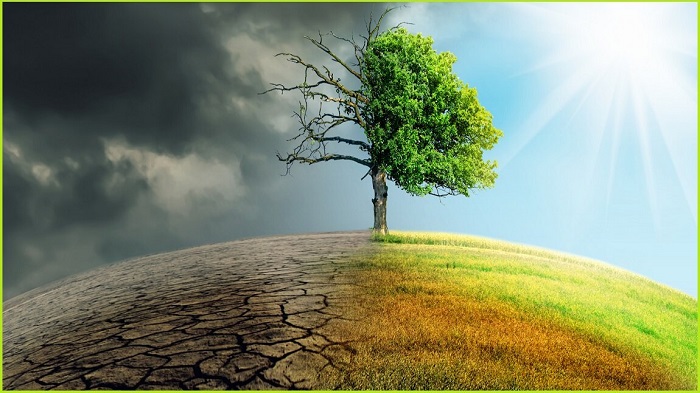Surjit Singh Flora
(Samajweekly) According to new research published in the Journal of Global Health, pregnant women, newborns, children, adolescents and the elderly are facing serious health problems due to climate change, yet the special needs of these groups are largely ignored.
These published articles document the available scientific evidence on the health effects of various climate hazards at key stages in life, from heat waves to air pollution and natural disasters such as wildfires and floods.
The drawbacks far exceed the benefits. There’s more to it than just feeling warmer. If that were the case, perhaps climate change would have some positive effects. One of the primary concerns revolves around the rapidity of the warming process. Organisms are facing significant challenges in keeping up with the rapid pace of change.
The drawbacks of species, including ourselves, struggling to cope with the abrupt change far outweigh any benefits.
Together, they show that climate-related health risks are significantly underestimated, with serious, often life-threatening effects, for young and old people and during pregnancy. For which people are paying a heavy price by experiencing extreme heat, the article shows that premature births, the leading cause of childhood deaths, increase during heat waves. While older people are more likely to have heart attacks or breathing problems,. Each additional degree Celsius (1 degree Celsius) in daily minimum temperature above 23.9 degrees Celsius has been shown to increase the risk of infant mortality by 22.4 percent.
These studies clearly show that climate change is posing a huge health threat and that some populations are already paying a heavy price. “
Dr. Anshu Banerjee, the Director for the Department of Maternal, Newborn, Child and Adolescent Health and Ageing at the World Health Organization (WHO), has said that while awareness of climate change has grown, action to protect the lives of those most at risk has barely scratched the surface of what is needed. To achieve climate justice, this must be addressed urgently,” he added. The collection, titled ‘Climate Change Across the Life Course’, written by WHO experts and academics from around the world, reports on the specific physical and mental health impacts caused by various climate hazards.
For example, high temperature are associated with adverse birth outcomes, mainly preterm birth and stillbirth, as well as hypertension and gestational diabetes in pregnancy. Heat waves affect cognitive function and, therefore, learning for children and teenagers, while increasing heart attacks and respiratory complications in older people. Also, environmental pollution increases the likelihood of high blood pressure during pregnancy, low birth weight, premature birth, and negative effects on fetal brain and lung development. It increases the risk of respiratory disease in children and the elderly, who face a higher risk of cancer, cardiovascular disease, and pneumonia. In addition, climate-related natural disasters have a significant impact on mental and physical health. Floods and droughts reduce access to safe water and food supplies, increasing diarrheal diseases and malnutrition. Wildfires have been shown to increase respiratory disease and cardiovascular mortality for older people. Although climate change affects everyone, climate-related displacement and disruption have serious consequences for people who need regular access to health services and social support. Infants and the elderly, as well as pregnant women, may have specific physical risk factors, such as difficulty with temperature regulation, vulnerability to dehydration, and/or a weakened immune system. They also face the indirect effects of climate change and related disasters, such as food and water scarcity and an increase in vector and water-borne diseases.
“A healthy environment reflects lifelong health, enabling healthy growth and development in childhood and adolescence, healthy pregnancy and healthy aging,” said Anaida Portella, a scientist at WHO, “reduces greenhouse gas emissions.” There is an urgent need to mitigate climate change to build climate resilience; to take specific actions that protect health at these different stages of life, and to provide health services for those most at risk when climate disasters occur. Steps need to be taken to ensure continuity.
Cognitive Barriers By documenting the health impacts of various climate risks for specific populations, researchers aim to help governments and programs address risks and plan for action. Currently, some climate adaptation measures are tailored to the specific needs of women, infants, children and adolescents, the authors note, as well as older people who may have mobility and cognitive impairments. Measures should include preparing childcare, social care and education systems for extreme weather events and rising temperatures, as well as engaging people of all ages in climate action, dialogue and planning. The year 2023 was the hottest year on record in more than 170 years, and there were many climate emergencies, from wildfires to hurricanes, floods, and extreme heat.
A fatal heatwave swept wide parts of Asia for weeks in April and May 2024, with temperatures reaching 110 degrees Fahrenheit (43.3 Celsius) in India on May 7. Politicians, local news broadcasters, and voters passed out due to the terrible heat. From Japan to the Philippines, the persistent heat disturbed daily life. In Cambodia, pupils and instructors were sent home because hand-held fans offered little respite in poorly ventilated classrooms. Thai farmers saw crops wither and cattle suffer under the scorching sun, resulting in hundreds of heat-related fatalities.
In recent years, the globe has seen an increase in the incidence of intense heat. In 2023, Phoenix had a weeks-long heatwave with temperatures of 110 degrees Fahrenheit (43.3 degrees Celsius) or above on 31 consecutive days. Europe saw extraordinary temperatures, which killed hundreds and sparked flames in Greece. Elderly people are especially sensitive to excessive heat, and the issue is projected to intensify.
Our study on climate change and population aging indicates two alarming patterns. First, global temperatures are higher than ever, with 2015-2023 being the warmest period on record. Second, the world’s population is aging, with the number of individuals aged 60 and over predicted to quadruple to 2.1 billion by 2050, accounting for 21% of the population.
By 2050, more than 23% of individuals aged 69 and older would live in areas with peak temperatures over 99.5 degrees Fahrenheit (37.5 degrees Celsius), up from 14% now. This implies that 250 million extra elderly people will suffer dangerously high temperatures. The majority will be in low- and middle-income nations with minimal services and limited access to energy, cooling equipment, and clean drinking water.
Policymakers, communities, and families must recognize and plan for these hazards. High temperatures may be fatal for older persons, aggravating existing health issues and increasing susceptibility to dehydration and bad air quality. Effective regional policies and substantial expenditures are required to safeguard elderly people from rising heat hazards.
Nevertheless, the transition to clean energy infrastructure is unavoidable, and when we do so, we will create a great number of new employments that are safer and cleaner, and we will do it without the hazardous safety record that coal has. Those who are willing to put their heads above their wallets and participate in the activities that are necessary will find that the future is bright and clean. The expense is monetary and there is a short-term impact. The benefits include the preservation of people and species for all of time. There are now deniers who are attempting to complicate the problem by adding ideological hatred to what is fundamentally a requirement for scientific and risk assessments. See many other comments for more information. We should start and finish this transition phase for reducing profits as quickly as possible, and then go on to a future that is cleaner and more sober. It is only those who deny the facts of climate change that make this confusing and unpleasant.









